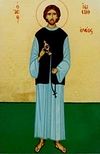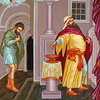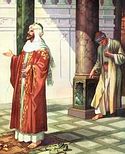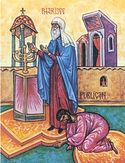

| Previous day | Next day |
| Old Style
February 4
|
Sunday |
New Style
February 17
|
| Sunday of the Publican and the Pharisee. Tone 5. | No fast.
|
![]() St. Isidore of Pelusium, monk (ca. 436-440).
St. Isidore of Pelusium, monk (ca. 436-440). ![]() St. George, prince of Vladimir (1238).
St. George, prince of Vladimir (1238). ![]() St. Cyril, founder of New Lake Monastery (Novgorod) (1532).
St. Cyril, founder of New Lake Monastery (Novgorod) (1532).
Martyrs Jadorus and Isidore, who suffered under Decius (3rd c.). Hieromartyr Abramius, bishop of Arbela in Assyria (ca. 344-347). St. Nicholas the Confessor, abbot, of the Studion (868). Sts. Abraham and Coprius, founders of Pechenga Monastery (Vologda) (15th c.).
New Hieromartyr Methodius (Krasnoperov), bishop of Petropavlovsk (1921). New Hieromartyrs Theodosius (Bobkov), hieromonk of the Chudov Monastery (Moscow), Nicholas Kandaurov, archpriest (Moscow), Boris Nazarov, archpriest, of Protasievo (Verey), Alexander Pokrovsky, archpriest, of Mineyevo (Moscow), Alexander Sokolov, archpriest, of Paveltsovo (Moscow), Peter Sokolov, archpriest, of Klin (Moscow), John Tikhomirov, archpriest, of Petrovskoye (Moscow), and Nicholas Pospelov, priest, of Bylovo (Podolsk) (1938). New Martyr Raphaela, schemanun, of Moscow (1938).
Hieromartyr Phileas, bishop of Thmuis, and Martyr Philoromus the Magistrate (ca. 303). St. John of Irenopolis (ca. 325). St. Evagrius, fellow-ascetic of St. Shio of Mgvime, Georgia (6th c.). Hieromartyr Aldate of Gloucester (6th c.). New Martyr Joseph of Aleppo in Syria (1686).
Repose of the royal recluse Nun Dosithea of Moscow (1810).
Thoughts for Each Day of the Year
According to the Daily Church Readings from the Word of God
By St. Theophan the Recluse

Sunday of the Publican and the Pharisee (33rd). [II Tim. 3:10–15; Luke 18:10–14]
Yesterday the Gospel reading taught us persistence in prayer, and now it teaches humility, or a feeling of having no right to be heard. Do not assume that you have the right to be heard, but approach prayer as one unworthy of any attention, allowing yourself only the boldness needed to open your mouth and raise up your prayer to God, knowing the Lord’s boundless condescension toward us poor ones. Do not even allow the thought to come to your mind, “I did such and such—so give me such and such.” Consider whatever you might have done as your obligation. If you had not done it you would have been subject to punishment, and what you did is actually nothing deserving reward; you did not do anything special. That Pharisee enumerated his rights to be heard, and left the church with nothing. The harm is not that he had actually done as he said, for indeed he should have done it. The harm is that he presented it as something special; whereas, having done it he should have thought no more of it. Deliver us, O Lord, from this sin of the Pharisee! One rarely speaks as the Pharisee in words, but in the feelings of the heart, one is rarely unlike him. For why is it that people pray badly? It is because they feel as though they are just fine in the sight of God, even without praying.
Articles
 Venerable Cyril the Abbot and Wonderworker of Novoezersk, NovgorodSaint Cyril of New Lake was born into a pious family. The Lord marked him as one of the chosen even before he was born. |
 Martyr JadorusSaint Jadorus suffered martyrdom with Saint Isidore (not Isidore of Pelusium) in the reign of Decius (249-251). |
 Hieromartyr Abramius the Bishop of Arbela in AssyriaThe Hieromartyr Abramius, Bishop of Arbela, suffered during a persecution against Christians in Persia under the emperor Sapor II. |
 Venerable Nicholas the Confessor the Abbot of StudionBecause of his life as a confessor and ascetic he received from God the gift of healing, which continued even after his repose in the year 868. |










